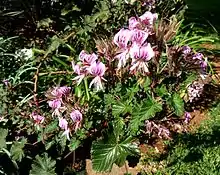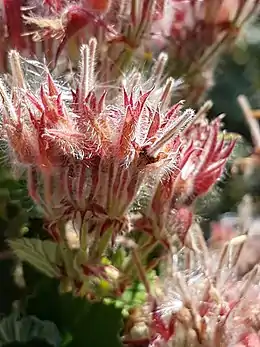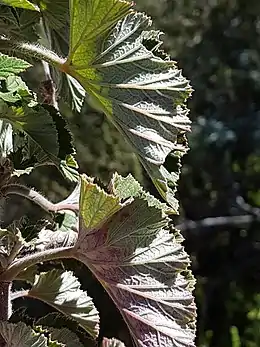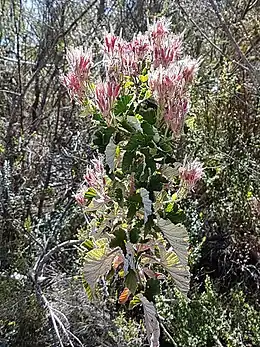Pelargonium cordifolium
Pelargonium cordifolium Curtis is a plant endemic to the fynbos region of the Southern Cape of South Africa.
| Pelargonium cordifolium | |
|---|---|
 | |
| Scientific classification | |
| Kingdom: | Plantae |
| Clade: | Tracheophytes |
| Clade: | Angiosperms |
| Clade: | Eudicots |
| Clade: | Rosids |
| Order: | Geraniales |
| Family: | Geraniaceae |
| Genus: | Pelargonium |
| Species: | P. cordifolium |
| Binomial name | |
| Pelargonium cordifolium Curtis | |
| Synonyms | |
|
Pelargonium cordatum L'Hér. | |
Etymology
Pelargonium is from Ancient Greek πελαργός (pelargós = 'stork'). Another name for pelargonium is 'storksbill' after the shape of its fruit; 'cordifolium' refers to the heart-shaped leaves (cor/cordis being 'heart' in Latin).
Description
Pelargonium cordifolium is a large, spreading species, growing up to 1.5 metres tall. It is a hairy plant with a slight apple scent and pale pink flowers with dark veins appearing from March to July. Its flat or curled, heart-shaped leaves are finely to coarsely toothed, entire or shallowly lobed, dark green on the upper surface and white-matted below. It is valued as a houseplant or as an outdoor perennial, climate permitting. Its leaves may be used in potpourris.[1]
Cultivars and hybrids
There are a few cultivars and hybrids of Pelargonium cordifolium. These include:
- Pelargonium cordifolium var. rubrocinctum - A variety with slightly paler leaves and reddish - pink flowers with maroon veins.
- Pelargonium cordifolium 'Caroline's Citrine' - A variety with golden leaves and dark blotches in the centre.
- Pelargonium cordifolium 'Donn's Goldstrike' - A variety with golden leaves similar to P.'Caroline's Citrine' but without the dark green blotches.
Gallery


